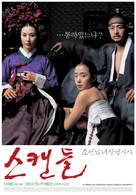Reviews provided by RottenTomatoes
Marta Barber, Miami Herald: A Frenchman may have thought of the story first, but this Korean film pays tribute to the original while perfectly standing on its own. Read more
Michael Wilmington, Chicago Tribune: Pictorially sumptuous and sexually provocative. Read more
Tom Keogh, Seattle Times: An elegant yet unassuming variation [Les Liaisons Dangereuses]. Read more
Ty Burr, Boston Globe: Of all the Liaisons adaptations, this may be the most sentimental. Read more
Kenneth Turan, Los Angeles Times: Choderlos de Laclos' novel has survived this long for a reason, and Untold Scandal shows us exactly what that is. Read more
Michael Booth, Denver Post: Adds a vibrant cultural framework to a familiar story, and it turns out nothing becomes a legend like an Asian makeover. Read more
Owen Gleiberman, Entertainment Weekly: Every attempt I have seen to adapt it on film -- Dangerous Liaisons, Cruel Intentions, even the trashy 1959 Roger Vadim version -- has resulted in an entertainment of agreeable nasty elegance. Until now. Read more
Ella Taylor, L.A. Weekly: Director Lee Je-Yong gives the book a makeover full of wit and startling beauty as a tragicomedy of Korean manners at the dawn of the Chosun dynasty in the late 18th century. Read more
Robert Dominguez, New York Daily News: Korean director Je-yong Lee puts a compelling cross-cultural spin on a familiar plot in this erotic, Eastern adaptation of the Chodelos de Laclos' 1782 French novel Les Liaisons Dangereuses. Read more
Elvis Mitchell, New York Times: This viciously purring Korean comedy of sexual conquest in the New Directors/New Films Series employs many of the plot mechanisms used in Christopher Hampton's version of Liaisons Dangereuses. Read more
Ed Park, Village Voice: E J-Yong's transposition illuminates, with satisfying crispness, the hyper-Confucian high society of the time, as well as the underground Catholic movement. Read more

